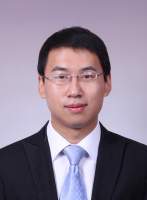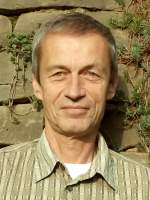- Forum
- categories
- Sanitation systems
- Toilets with urine diversion
- Urine treatment, transport, storage
- Join the online PhD Defence on Alkaline Urine Dehydration - How to dry source-separated human urine and recover nutrients? (Wednesday, 02 June 2021, at 13:00)
Join the online PhD Defence on Alkaline Urine Dehydration - How to dry source-separated human urine and recover nutrients? (Wednesday, 02 June 2021, at 13:00)
16.1k views
- csk
-

- I work on the toilet, sanitation, biogas, FSM, environmental science and engineering, and I hope to contribute to the toilet revolution in China and in the global. I am happy to share Chinese WASH story.
Less- Posts: 42
- Karma: 1
- Likes received: 15
Re: Join the online PhD Defence on Alkaline Urine Dehydration - How to dry source-separated human urine and recover nutrients? (Wednesday, 02 June 2021, at 13:00)
Great to know a PhD thesis on toilet and sanitation.
Congratulations!
Cheng
Congratulations!
Cheng
Shikun Cheng,
Professor, Ph.D
Center for Sustainable Environmental Sanitation (CSES)
Department of Environmental Science and Engineering
University of Science and Technology Beijing (USTB)
This email address is being protected from spambots. You need JavaScript enabled to view it.
Professor, Ph.D
Center for Sustainable Environmental Sanitation (CSES)
Department of Environmental Science and Engineering
University of Science and Technology Beijing (USTB)
This email address is being protected from spambots. You need JavaScript enabled to view it.
Please Log in to join the conversation.
You need to login to reply- jrmcconville
-

- I have a background in environmental engineering and planning with a focus on sanitation and wastewater management. My research focuses on resource recovery using concepts of sustainability, life-cycle thinking, participation, serious gaming and decision-support frameworks to better understand and shape planning processes.
Re: Join the online PhD Defence on Alkaline Urine Dehydration - How to dry source-separated human urine and recover nutrients? (Wednesday, 02 June 2021, at 13:00)
In case you missed it, you can see a recording of the defense on this link:
Video: fb.watch/5UyW-9wDcb/
The full thesis is available here: pub.epsilon.slu.se/23473/
Video: fb.watch/5UyW-9wDcb/
The full thesis is available here: pub.epsilon.slu.se/23473/
Dr. Jennifer McConville
Associate Professor
Swedish University of Agricultural Sciences
Department of Energy and Technology
Environmental Engineering
Box 7032, SE-750 07 UPPSALA
Telephone: +46 18-672 816
Mobile: +46 76 783 7084
Skype: jrmcconville
Blogg: blogg.slu.se/kretsloppsteknik/
Email: This email address is being protected from spambots. You need JavaScript enabled to view it.
Associate Professor
Swedish University of Agricultural Sciences
Department of Energy and Technology
Environmental Engineering
Box 7032, SE-750 07 UPPSALA
Telephone: +46 18-672 816
Mobile: +46 76 783 7084
Skype: jrmcconville
Blogg: blogg.slu.se/kretsloppsteknik/
Email: This email address is being protected from spambots. You need JavaScript enabled to view it.
Please Log in to join the conversation.
You need to login to reply- jrmcconville
-

- I have a background in environmental engineering and planning with a focus on sanitation and wastewater management. My research focuses on resource recovery using concepts of sustainability, life-cycle thinking, participation, serious gaming and decision-support frameworks to better understand and shape planning processes.
Re: Join the online PhD Defence on Alkaline Urine Dehydration - How to dry source-separated human urine and recover nutrients? (Wednesday, 02 June 2021, at 13:00)
You're all welcome to join the public defence of the Doctoral Thesis for
Prithvi Simha
, entitled “
Alkaline Urine Dehydration. How to dry source-separated human urine and recover nutrients
?”, which will take place via Zoom.
When? Wednesday, 02 June 2021, at 13:00.
Join the Defence via Zoom: slu-se.zoom.us/j/69422000884 with Passcode: 732271
The thesis is openly available at: pub.epsilon.slu.se/23473/
External reviewer: Professor Nancy Love, The University of Michigan, Ann Arbor, USA.
Examining committee: Professor Annelie Hedström, Luleå University of Technology, Luleå, Sweden; Docent Sebastian Schwede, Mälardalen
University, Västerås, Sweden; and PhD Surendra Pradhan, University of
Eastern Finland, Kuopia, Finland
Supervisor: Professor Bjorn Vinneras, SLU
Assistant supervisors: Docent Cecilia Lalander, SLU and Docent Annika Nordin, SLU
Abstract
Human urine is a renewable resource from which water, nutrients and
energy can be recovered and safely recycled. This thesis presents a
novel on-site technology, called alkaline dehydration, for recovering
nutrients from source-separated urine.
To recover urea (the major nitrogenous compound in fresh urine) and
prevent its urease enzyme-catalysed hydrolysis to ammonia, fresh urine
was alkalised to pH ≥10 by anion exchange or use of alkaline substrates.
To reduce the volume and concentrate the nutrients, the alkalised urine
was dried in different substrates at temperatures of40-60 °C. To
evaluat ealkaline urine dehydration at pilot-scale, a prototype dryer
with capacity to treat 30 L urine d–1 was built and field-tested for
three months at a military camp in Finland.
More than 90% of the urine mass was reduced and dehydration rates of
upto 40 L urine d–1m–2 were obtained. Up to 98% of the nitrogen (N) and
100% of the phosphorus (P) and potassium (K) in urine were recovered. A
dry solid containing 10% N, 1.5% P and 6.0% K, with similar salt and
heavy metal content to synthetic fertilisers available in Sweden was
produced.
At least 12.5 g Ca(OH)2 or 6.8 g MgO per litre of fresh urine was
required to buffer the pH of urine against absorption of CO2 during
dehydration. The energy demand for evaporating urine was similar to
that of incineration toilets, but could be reduced if heat energy from
the dryer’s exhaust air were recovered.
Overall, this thesis shows that a new sanitation system that safely
collects, treats, transports and applies urine as fertiliser could be
created
by integrating alkaline urine dehydration with existing infrastructure.
If implemented globally, this system could recycle 31 Tg N y–1 and 2.8Tg
P y–1, which would reduce the transgression of the planetary boundary
for N and P by 35% and 25%, respectively.
Keywords: Circular Bioeconomy, Fertiliser, Resource recovery, Safe Nutrient Recycling, Sanitation, Source separation, Urine diversion,
Wastewater treatment.
Author’s address: Prithvi Simha, SLU, Department of Energy and Technology,
P.O. Box 7032, SE-750 07 Uppsala, Sweden.
E-mail: This email address is being protected from spambots. You need JavaScript enabled to view it.
When? Wednesday, 02 June 2021, at 13:00.
Join the Defence via Zoom: slu-se.zoom.us/j/69422000884 with Passcode: 732271
The thesis is openly available at: pub.epsilon.slu.se/23473/
External reviewer: Professor Nancy Love, The University of Michigan, Ann Arbor, USA.
Examining committee: Professor Annelie Hedström, Luleå University of Technology, Luleå, Sweden; Docent Sebastian Schwede, Mälardalen
University, Västerås, Sweden; and PhD Surendra Pradhan, University of
Eastern Finland, Kuopia, Finland
Supervisor: Professor Bjorn Vinneras, SLU
Assistant supervisors: Docent Cecilia Lalander, SLU and Docent Annika Nordin, SLU
Abstract
Human urine is a renewable resource from which water, nutrients and
energy can be recovered and safely recycled. This thesis presents a
novel on-site technology, called alkaline dehydration, for recovering
nutrients from source-separated urine.
To recover urea (the major nitrogenous compound in fresh urine) and
prevent its urease enzyme-catalysed hydrolysis to ammonia, fresh urine
was alkalised to pH ≥10 by anion exchange or use of alkaline substrates.
To reduce the volume and concentrate the nutrients, the alkalised urine
was dried in different substrates at temperatures of40-60 °C. To
evaluat ealkaline urine dehydration at pilot-scale, a prototype dryer
with capacity to treat 30 L urine d–1 was built and field-tested for
three months at a military camp in Finland.
More than 90% of the urine mass was reduced and dehydration rates of
upto 40 L urine d–1m–2 were obtained. Up to 98% of the nitrogen (N) and
100% of the phosphorus (P) and potassium (K) in urine were recovered. A
dry solid containing 10% N, 1.5% P and 6.0% K, with similar salt and
heavy metal content to synthetic fertilisers available in Sweden was
produced.
At least 12.5 g Ca(OH)2 or 6.8 g MgO per litre of fresh urine was
required to buffer the pH of urine against absorption of CO2 during
dehydration. The energy demand for evaporating urine was similar to
that of incineration toilets, but could be reduced if heat energy from
the dryer’s exhaust air were recovered.
Overall, this thesis shows that a new sanitation system that safely
collects, treats, transports and applies urine as fertiliser could be
created
by integrating alkaline urine dehydration with existing infrastructure.
If implemented globally, this system could recycle 31 Tg N y–1 and 2.8Tg
P y–1, which would reduce the transgression of the planetary boundary
for N and P by 35% and 25%, respectively.
Keywords: Circular Bioeconomy, Fertiliser, Resource recovery, Safe Nutrient Recycling, Sanitation, Source separation, Urine diversion,
Wastewater treatment.
Author’s address: Prithvi Simha, SLU, Department of Energy and Technology,
P.O. Box 7032, SE-750 07 Uppsala, Sweden.
E-mail: This email address is being protected from spambots. You need JavaScript enabled to view it.
Dr. Jennifer McConville
Associate Professor
Swedish University of Agricultural Sciences
Department of Energy and Technology
Environmental Engineering
Box 7032, SE-750 07 UPPSALA
Telephone: +46 18-672 816
Mobile: +46 76 783 7084
Skype: jrmcconville
Blogg: blogg.slu.se/kretsloppsteknik/
Email: This email address is being protected from spambots. You need JavaScript enabled to view it.
Associate Professor
Swedish University of Agricultural Sciences
Department of Energy and Technology
Environmental Engineering
Box 7032, SE-750 07 UPPSALA
Telephone: +46 18-672 816
Mobile: +46 76 783 7084
Skype: jrmcconville
Blogg: blogg.slu.se/kretsloppsteknik/
Email: This email address is being protected from spambots. You need JavaScript enabled to view it.
The following user(s) like this post: Jsenecal, Wolase
Please Log in to join the conversation.
You need to login to replyRe: Join the online PhD Defence on Alkaline Urine Dehydration - How to dry source-separated human urine and recover nutrients? (Wednesday, 02 June 2021, at 13:00)
Dear Heiner,
Of course! Please feel free to forward it to students who may find the topic interesting.
Yes, it will be at 13:00 Sweden Time.
The format is that, I will first present a summary of my findings for approximately 30 minutes, after which it is the turn of the opponent and the examination committee to evaluate the thesis.
Welcome!
Best Regards
Prithvi
Of course! Please feel free to forward it to students who may find the topic interesting.
Yes, it will be at 13:00 Sweden Time.
The format is that, I will first present a summary of my findings for approximately 30 minutes, after which it is the turn of the opponent and the examination committee to evaluate the thesis.
Welcome!
Best Regards
Prithvi
Please Log in to join the conversation.
You need to login to reply- Heiner
-

- I am a retired organic farmer and interested in nutrient cycles. As an volunteer I now travel mainly to poor countries and together with locals I would like to find new ways of sustainable agriculture. This is beyond the regulations of IFOAM.
Less- Posts: 80
- Karma: 1
- Likes received: 67
Re: Join the online PhD Defence on Alkaline Urine Dehydration - How to dry source-separated human urine and recover nutrients? (Wednesday, 02 June 2021, at 13:00)
Dear Prithvi Simha,
great idea to share your PhD Defence! Hope we don't make you nervous ?
Do you mind if I share this info with some students here in Germany? And is it 13:00 swedish time?
All the best for the defence. And on behalf of the planet: thanks for the research you did!
Heiner
-- Heiner Petersen Borgmannsweg 6 42781 Haan
0162 3096027
This email address is being protected from spambots. You need JavaScript enabled to view it.
great idea to share your PhD Defence! Hope we don't make you nervous ?
Do you mind if I share this info with some students here in Germany? And is it 13:00 swedish time?
All the best for the defence. And on behalf of the planet: thanks for the research you did!
Heiner
-- Heiner Petersen Borgmannsweg 6 42781 Haan
0162 3096027
This email address is being protected from spambots. You need JavaScript enabled to view it.
Heiner, the old farmer.....
Please Log in to join the conversation.
You need to login to replyJoin the online PhD Defence on Alkaline Urine Dehydration - How to dry source-separated human urine and recover nutrients? (Wednesday, 02 June 2021, at 13:00)
You're all welcome to join the public defence of the Doctoral Thesis for
Prithvi Simha
, entitled “
Alkaline Urine Dehydration. How to dry source-separated human urine and recover nutrients
?”, which will take place via Zoom.
When? Wednesday, 02 June 2021, at 13:00.
Join the Defence via Zoom: slu-se.zoom.us/j/69422000884 with Passcode: 732271
The thesis is openly available at: pub.epsilon.slu.se/23473/
External reviewer: Professor Nancy Love, The University of Michigan, Ann Arbor, USA.
Examining committee: Professor Annelie Hedström, Luleå University of Technology, Luleå, Sweden; Docent Sebastian Schwede, Mälardalen University, Västerås, Sweden; and PhD Surendra Pradhan, University of Eastern Finland, Kuopia, Finland
Supervisor: Professor Bjorn Vinneras, SLU
Assistant supervisors: Docent Cecilia Lalander, SLU and Docent Annika Nordin, SLU
Abstract
Human urine is a renewable resource from which water, nutrients and energy can be recovered and safely recycled. This thesis presents a novel on-site technology, called alkaline dehydration, for recovering nutrients from source-separated urine.
To recover urea (the major nitrogenous compound in fresh urine) and prevent its urease enzyme-catalysed hydrolysis to ammonia, fresh urine was alkalised to pH ≥10 by anion exchange or use of alkaline substrates. To reduce the volume and concentrate the nutrients, the alkalised urine was dried in different substrates at temperatures of40-60 °C. To evaluat ealkaline urine dehydration at pilot-scale, a prototype dryer with capacity to treat 30 L urine d–1 was built and field-tested for three months at a military camp in Finland.
More than 90% of the urine mass was reduced and dehydration rates of upto 40 L urine d–1m–2 were obtained. Up to 98% of the nitrogen (N) and 100% of the phosphorus (P) and potassium (K) in urine were recovered. A dry solid containing 10% N, 1.5% P and 6.0% K, with similar salt and heavy metal content to synthetic fertilisers available in Sweden was produced.
At least 12.5 g Ca(OH)2 or 6.8 g MgO per litre of fresh urine was required to buffer the pH of urine against absorption of CO2 during dehydration. The energy demand for evaporating urine was similar to that of incineration toilets, but could be reduced if heat energy from the dryer’s exhaust air were recovered.
Overall, this thesis shows that a new sanitation system that safely collects, treats, transports and applies urine as fertiliser could be created
by integrating alkaline urine dehydration with existing infrastructure. If implemented globally, this system could recycle 31 Tg N y–1 and 2.8Tg P y–1, which would reduce the transgression of the planetary boundary for N and P by 35% and 25%, respectively.
Keywords: Circular Bioeconomy, Fertiliser, Resource recovery, Safe Nutrient Recycling, Sanitation, Source separation, Urine diversion, Wastewater treatment.
Author’s address: Prithvi Simha, SLU, Department of Energy and Technology,
P.O. Box 7032, SE-750 07 Uppsala, Sweden.
E-mail: This email address is being protected from spambots. You need JavaScript enabled to view it.
When? Wednesday, 02 June 2021, at 13:00.
Join the Defence via Zoom: slu-se.zoom.us/j/69422000884 with Passcode: 732271
The thesis is openly available at: pub.epsilon.slu.se/23473/
External reviewer: Professor Nancy Love, The University of Michigan, Ann Arbor, USA.
Examining committee: Professor Annelie Hedström, Luleå University of Technology, Luleå, Sweden; Docent Sebastian Schwede, Mälardalen University, Västerås, Sweden; and PhD Surendra Pradhan, University of Eastern Finland, Kuopia, Finland
Supervisor: Professor Bjorn Vinneras, SLU
Assistant supervisors: Docent Cecilia Lalander, SLU and Docent Annika Nordin, SLU
Abstract
Human urine is a renewable resource from which water, nutrients and energy can be recovered and safely recycled. This thesis presents a novel on-site technology, called alkaline dehydration, for recovering nutrients from source-separated urine.
To recover urea (the major nitrogenous compound in fresh urine) and prevent its urease enzyme-catalysed hydrolysis to ammonia, fresh urine was alkalised to pH ≥10 by anion exchange or use of alkaline substrates. To reduce the volume and concentrate the nutrients, the alkalised urine was dried in different substrates at temperatures of40-60 °C. To evaluat ealkaline urine dehydration at pilot-scale, a prototype dryer with capacity to treat 30 L urine d–1 was built and field-tested for three months at a military camp in Finland.
More than 90% of the urine mass was reduced and dehydration rates of upto 40 L urine d–1m–2 were obtained. Up to 98% of the nitrogen (N) and 100% of the phosphorus (P) and potassium (K) in urine were recovered. A dry solid containing 10% N, 1.5% P and 6.0% K, with similar salt and heavy metal content to synthetic fertilisers available in Sweden was produced.
At least 12.5 g Ca(OH)2 or 6.8 g MgO per litre of fresh urine was required to buffer the pH of urine against absorption of CO2 during dehydration. The energy demand for evaporating urine was similar to that of incineration toilets, but could be reduced if heat energy from the dryer’s exhaust air were recovered.
Overall, this thesis shows that a new sanitation system that safely collects, treats, transports and applies urine as fertiliser could be created
by integrating alkaline urine dehydration with existing infrastructure. If implemented globally, this system could recycle 31 Tg N y–1 and 2.8Tg P y–1, which would reduce the transgression of the planetary boundary for N and P by 35% and 25%, respectively.
Keywords: Circular Bioeconomy, Fertiliser, Resource recovery, Safe Nutrient Recycling, Sanitation, Source separation, Urine diversion, Wastewater treatment.
Author’s address: Prithvi Simha, SLU, Department of Energy and Technology,
P.O. Box 7032, SE-750 07 Uppsala, Sweden.
E-mail: This email address is being protected from spambots. You need JavaScript enabled to view it.
This message has an attachment file.
Please log in or register to see it.
Please Log in to join the conversation.
You need to login to reply
Share this thread:
- Forum
- categories
- Sanitation systems
- Toilets with urine diversion
- Urine treatment, transport, storage
- Join the online PhD Defence on Alkaline Urine Dehydration - How to dry source-separated human urine and recover nutrients? (Wednesday, 02 June 2021, at 13:00)
Recently active users. Who else has been active?
Time to create page: 0.284 seconds







